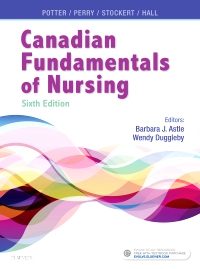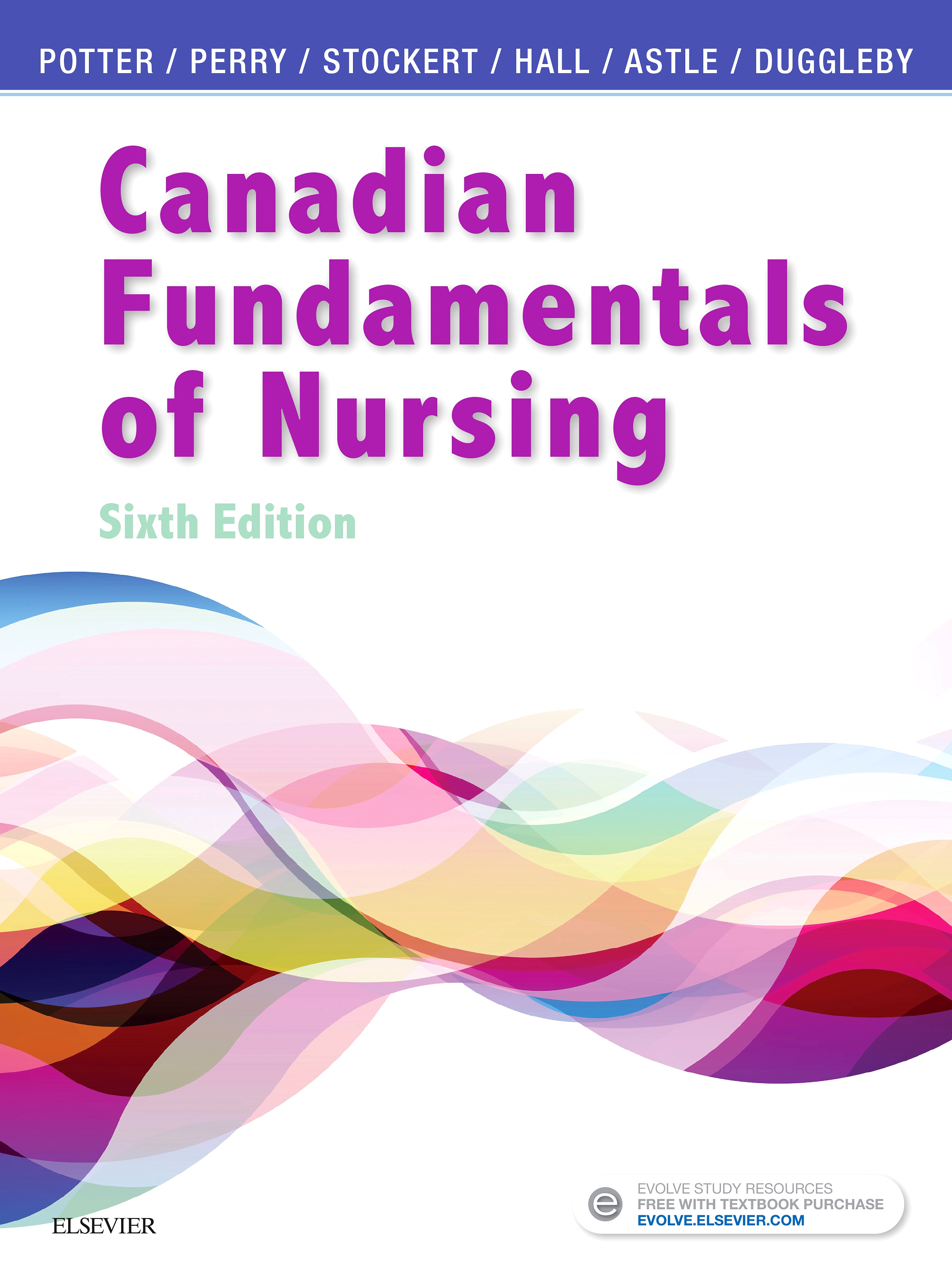
Canadian Fundamentals of Nursing - Elsevier eBook on VitalSource, 6th Edition
Elsevier eBook on VitalSource

With a greater emphasis on, and integration of, interprofessional collaboration, health literacy, and clinical reasoning, Canadian Fundamentals of Nursing, Sixth Edition provides students with the solid educational foundation to learn nursing principles, concepts, and skills with ease. This title’s proven, student-friendly approach describes the principles, concepts, and skills essential to your students' success, and comprehensive educator support tools seamlessly coordinate all of your course resources to enhance your teaching capabilities and help you meet all of your curriculum goals. The Sixth Edition includes new chapters focused on the health needs of Indigenous people along with information on how to collaborate among interprofessional disciplines. Thoroughly reviewed by Canadian nursing experts, this edition ensures that your students are well prepared to practise in Canada.
Newer Edition Available
Potter and Perry's Canadian Fundamentals of Nursing - Elsevier eBook on VitalSource
-
- NEW! Chapter addresses interprofessional collaboration which focuses on patient-centered care
- NEW! Chapter addresses the health of indigenous people referencing the Truth and Reconciliation Commission (TRC) Report
- NEW! Greater emphasis on interprofessional collaboration, health literacy, and clinical reasoning throughout the text
- UPDATED! CNA Code of Ethics, as well as new Medical Assistance in Dying (MAID) legislation has been integrated in many chapters
- NEW! UNIQUE! Critical Thinking Exercises are included with every chapter which correlate directly with the case study presented in the care plan
- A completely revised 1,300-question Test bank, with both traditional multiple-choice and alternate item questions at all difficulty levels (with an emphasis on application level questions)
- TEACH for Nurses lesson plan manuals (RN and PN versions) will help instructors more easily implement the elements of our fundamentals offerings appropriate to their classroom
- New photos capture the latest updates in skills and equipment relevant to Canadian nursing practise
- Case studies include unique clinical application questions and exercises, allowing students to practise using care plans and concept maps
- Cultural Aspects of Care boxes summarize cultural considerations related to the chapter topic and provide practical guidelines for how to meet patients’ cultural needs and preferences
- Patient Teaching boxes help students plan effective teaching by first identifying outcomes, then developing strategies on how to teach, and, finally, implementing measures to evaluate learning
- More than 50 skills demonstrations provide illustrated, step-by-step instructions for safe nursing care — and include rationales for each step
- The 5-step nursing process provides a consistent framework for care, and is demonstrated in more than 20 care plans
- More than 20 concept maps show care planning for clients with multiple nursing diagnoses
- Focus on Older Persons boxes highlight key aspects of nursing assessment and care for this population
- Planning sections help nurses plan and prioritize care by emphasizing Goals and Outcomes, Setting Priorities, and Teamwork and Collaboration
- Key points and key terms in each chapter summarize important content for more efficient review and study
- Implementation sections cover health promotion, acute care, and continuing care to prepare students for all levels of care in all settings
- Unexpected Outcomes and Related Interventions for each skill offer alerts to potential problems and appropriate nursing actions
- Procedural guidelines provide streamlined, step-by-step instructions for performing basic skills
- UNIQUE! Critical Thinking Models in each clinical chapter show students how to apply the nursing process and critical thinking to achieve successful clinical outcomes
- Nursing diagnoses are incorporated into care plans to reflect national standards
- Evidence-Informed Practice chapter includes the concept of research literacy and discusses quality improvement (QI)
- A glossary provides quick access to definitions for all key terms
-
- NEW! Greater emphasis on interprofessional collaboration, health literacy, and clinical reasoning throughout the text
- NEW! Chapter addresses the health of Indigenous people covering the Truth and Reconciliation Commission (TRC) Report
- UPDATED! CNA Code of Ethics, as well as new Medical Assistance in Dying (MAID) legislation has been integrated in many chapters
- NEW! UNIQUE! Critical Thinking questions are included with every chapter which correlate directly with the case study presented in the care plan
- NEW! Chapter addresses interprofessional collaboration which focuses on patient-centred care
-
Unit 1: Health and Health Care in Canada
1. Health and Wellness
2. The Canadian Health Care Delivery System
3. The Development of Nursing in Canada
4. Community Health Nursing Practice
Unit II: Foundations of Nursing Practice
5. Theoretical Foundations of Nursing Practice
6. Evidence-Informed Practice
7. Nursing Values and Ethics
8. Legal Implications in Nursing Practice
9. Global Health
10. Indigenous Health (NEW)
11. Nursing Leadership, Management, and Collaborative Practice
Unit III: Approaches to Nursing Care
12. Critical Thinking in Nursing Practice
13. Nursing Assessment, Diagnosis, and Planning
14. Implementing and Evaluating Nursing Care
15. Documenting and Reporting
16. Nursing Informatics and Canadian Nursing Practice
Unit IV: Working with Patients and Families
17. Communication and Relational Practice
18. Patient-Centred Care: Interprofessional Collaborative Practice (NEW)
19. Family Nursing
20. Patient Education
Unit V: Caring Throughout the Lifespan
21. Developmental Theories
22. Conception Through Adolescence
23. Young to Middle Adulthood
24. Older Persons
25. The Experience of Loss, Death, and Grief
Unit VI: Psychosocial Considerations
26. Self-Concept
27. Sexuality
28. Spirituality in Health and Health Care
29. Stress and Adaptation
Unit VII: Scientific Basis for Nursing Practice
30. Vital Signs
31. Pain Assessment and Management
32. Health Assessment and Physical Examination
33. Infection Prevention and Control
34. Medication Administration
35. Complementary and Alternative Approaches in Health Care
Unit VIII: Basic Physiological Needs
36. Activity and Exercise
37. Quality and Patient Safety
38. Hygiene
39. Cardiopulmonary Functioning and Oxygenation
40. Fluid, Electrolyte, and Acid-Base Balances
41. Sleep
42. Nutrition
43. Urinary Elimination
44. Bowel Elimination
Unit IX: Patients with Special Needs
45. Mobility and Immobility
46. Skin Integrity and Wound Care
47. Sensory Alterations
48. Care of Surgical Patients



 as described in our
as described in our 